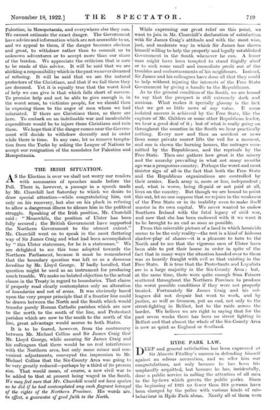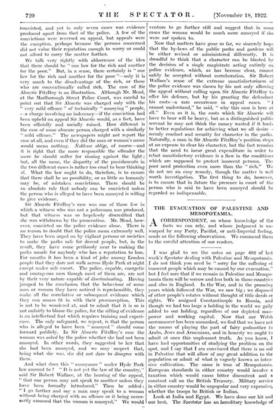HYDE PARK LAW. D EEP and general satisfaction has been expressed
at Sir Almeric FitzRoy's success in defending himself against an odious accusation, and we offer him our congratulations, not only because he has been tri- umphantly acquitted, but because he has, incidentally, done a public service in calling the attention of all men to the by-laws which govern the public parks. Since the beginning of 1921 no fewer than 318 persons have been charged by the police with various kinds of mis- behaviour in Hyde Park alone. Nearly all of them were Convicted, and -yet in only seven cases was evidence produced apart from that of the police. A few of the convictions were reversed on appeal, but appeals were the exception, perhaps because the persons concerned (lid not value their reputation enough to worry or could not afford to carry the matter further.
We talk very rightly with abhorrence of the idea that there should be " one law for the rich and another for the poor." But, in a sense, there certainly is " one law for the rich and another for the poor "--only it is very much to the disadvantage of the rich, or those who are conventionally called rich. The case of Sir Almeric FitzRoy is an illustration. Although Mr. Mead, at the Marlborough Street Police Court, was careful to point out that Sir Almerie was charged only with the " very mild offence " of technically " annoying " people, —a charge involving no indecency—if the conviction had been upheld on appeal Sir Almeric would, as a fact, have been officially and socially ruined. How different is the case of some obscure person charged with a similarly " mild offence." The newspapers might not report the case at all, and even if they did the man or woman's name would mean nothing. Noblesse oblige, of course—and it is right that the more responsible the offender the more he should suffer for sinning against the light ; but, all the same, the disparity of the punishments in the two different cases is rather too cruel to bear thinking Df. What the law ought to do, th&efore, is to ensure that there shall be no possibility, or as little as humanly may be, of mistaken convictions. There should be an absolute rule that nobody can be convicted unless the person who is alleged to have been annoyed is willing to give evidence.
Sir Almeric FitzRoy's case was one of those few in which a witness who was not a policeman was produced, but that witness was so hopelessly discredited that she was withdrawn by the prosecution. Mr. Mead, how- ever, convicted on the police evidence alone. There is no reason to doubt that the police mean extremely well. They have been urged on by vigilant persons or societies to make the parks safe for decent people, but, in the result, they have come perilously near to making the parks unsafe for anybody who has a reputation to lose. For months it has been a kind of joke among London people that they dare not walk across Hyde Park at night except under safe escort. The police, capable, energetic and courageous men though most of them are, are not by their very nature capable of discriminating. Having jumped to the conclusion that the behaviour of some man or woman they have noticed is reprehensible, they make all the correlative or subsequent evidence which they can amass fit in with their preconception. This is not to be wondered at, and to admit that it is so is not unfairly to blame the police, for the sifting of evidence is an intellectual feat which requires training and experi- ence. The only safeguard, we repeat, is that the person who is alleged to have been " annoyed " should come forward publicly. In Sir Almeric FitzRoy's case the woman was asked by the police whether she had not been annoyed. In other words, they suggested to her that she had been annoyed, and we may suspect that, being what she was, she did not dare to disagree with them.
And what does this " annoyance " under Hyde Park law amount to ? " It is not yet the law of the country," said Sir Robert Wallace, at the hearing of the appeal, " that one person may not speak to another unless they have been formally introduced." Then he added : " I go further and say a man may speak to a woman without being charged with an offence or it being neces- sarily assumed that the woman is annoyed." We would venture to go further still and suggest that in some eases the woinan would be much more annoyed if she were not spoken to.
Now that matters have gone so far, we sincerely hop that the by-laws of the public • parks and gardens will be either revised or administered differently. It is dreadful to think that a character can be blasted by the decision of a single magistrate acting entirely on police evidence, which, as has become clear, cannot safely be accepted without corroboration. Sir Robert Wallace's sense of the extreme unsatisfactoriness of the police evidence was shown by his not only allowing the appeal without calling upon Sir Almeric FitzRoy to offer his defence, bid by his granting the defendant his costs—a rare occurrence in appeal cases. " I cannot Aniderstand," he said, " why this case is here at all." Even as it is, the costs which Sir Almeric will have to bear will be heavy, but as a distinguished public servant he may not think the money wasted if it leads to better regulations for achieving what we all desire-- seemly conduct and security for character in the parks. Naturally, a man in Sir Almeric FitzRoy's position stops at no expense to clear his character, but the fact remains that the need to incur great expenditure in order to rebut unsatisfactory evidence is a flaw in the conditions which are supposed to protect innocent persons. The poor need protection even more than the " rich." We do not see an easy remedy, though the matter is well worth investigation. The first thing to do, however, is to ensure that in future the presence in court of the person who is said to have been annoyed should be regarded as indispensable.







































 Previous page
Previous page